 10 citations,
January 2015 in “Journal of Cutaneous Medicine and Surgery”
10 citations,
January 2015 in “Journal of Cutaneous Medicine and Surgery” Cold caps and certain drugs may help prevent or reduce hair loss from chemotherapy, but more research is needed.
 8 citations,
April 2021 in “Medical journal of the Islamic Republic of Iran”
8 citations,
April 2021 in “Medical journal of the Islamic Republic of Iran” Taking finasteride can partially improve oxygen levels in hospitalized male patients over 50 with COVID-19 pneumonia, but it doesn't affect other outcomes like death rate or hospital stay length.
 8 citations,
January 2017 in “Elsevier eBooks”
8 citations,
January 2017 in “Elsevier eBooks” Certain nutrients can help keep skin healthy as we age.
 8 citations,
July 2014 in “Hair transplant forum international”
8 citations,
July 2014 in “Hair transplant forum international” Bio-enhanced hair restoration, using methods like growth factors, stem cells, and ATP, results in better hair growth and density than traditional hair transplants.
 7 citations,
October 2020 in “Dermatology practical & conceptual”
7 citations,
October 2020 in “Dermatology practical & conceptual” Some skin, hair, and nail supplements can be toxic, interact with medications, affect lab tests, and may increase cancer risk.
 7 citations,
August 2017 in “PloS one”
7 citations,
August 2017 in “PloS one” Key genes linked to hair growth and cancer were identified in hairless mice.
6 citations,
September 2023 in “International journal of molecular sciences” Oxidative stress worsens PCOS by damaging cells and disrupting metabolism, suggesting antioxidant treatments might help.
 6 citations,
June 2011 in “Pharmacognosy Journal”
6 citations,
June 2011 in “Pharmacognosy Journal” Many products for hair re-growth exist, but a perfect treatment without side effects has not yet been found.
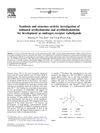 6 citations,
November 2004 in “Bioorganic & Medicinal Chemistry Letters”
6 citations,
November 2004 in “Bioorganic & Medicinal Chemistry Letters” Scientists created iodinated arylhydantoins and arylthiohydantoins that could potentially be used for imaging prostate cancer. Some versions with specific side-chains showed high potential for this use.
 5 citations,
February 2022 in “Acta Biomaterialia”
5 citations,
February 2022 in “Acta Biomaterialia” Nanomaterials can improve hair care products and treatments, including hair loss and alopecia, by enhancing stability and safety, and allowing controlled release of compounds, but their safety in cosmetics needs more understanding.
 5 citations,
May 2020 in “Diagnostics”
5 citations,
May 2020 in “Diagnostics” Lower zinc levels may predict less effective hair loss treatment.
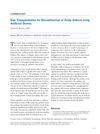 5 citations,
August 2011 in “Dermatologic Surgery”
5 citations,
August 2011 in “Dermatologic Surgery” Artificial dermis used for hair transplantation can reconstruct scalp defects effectively without the need for tissue expansion.
5 citations,
September 1991 in “Veterinary dermatology” Pygmy goats with seborrhoeic dermatitis showed skin symptoms and temporary improvement with corticosteroids, but the cause and inheritance of the disease remain unknown.
 4 citations,
August 2018 in “International Journal of Current Microbiology and Applied Sciences”
4 citations,
August 2018 in “International Journal of Current Microbiology and Applied Sciences” Eclipta prostrata leaves contain various compounds with medicinal properties.
 4 citations,
March 2006 in “Journal of renal nutrition”
4 citations,
March 2006 in “Journal of renal nutrition” Dialysis patients benefit from water-soluble vitamins but need careful management to avoid risks.
 4 citations,
May 2002 in “Aesthetic Surgery Journal”
4 citations,
May 2002 in “Aesthetic Surgery Journal” A new hair loss classification for women improves treatment, but careful patient selection is crucial for successful hair transplantation.
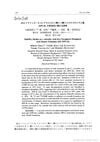 4 citations,
January 1994 in “Yakugaku zasshi”
4 citations,
January 1994 in “Yakugaku zasshi” EPC-K is stable except at very acidic pH or when exposed to sunlight, and it can decompose in low ethanol concentrations.
 3 citations,
April 2022 in “Clinical, Cosmetic and Investigational Dermatology”
3 citations,
April 2022 in “Clinical, Cosmetic and Investigational Dermatology” Different methods, including stress management, healthy diet, supplements, and treatments like minoxidil, can help hair grow back after COVID-19 related hair loss.
 3 citations,
January 2021 in “Journal of The American Academy of Dermatology”
3 citations,
January 2021 in “Journal of The American Academy of Dermatology” Different types of atopic dermatitis were linked to specific genetic and immune changes, suggesting that severe cases might need stronger immune-targeting treatments.
 2 citations,
September 2023 in “Scientific reports”
2 citations,
September 2023 in “Scientific reports” The nanocomposite films with vitamins and nanoparticles are promising for fast and effective burn wound healing.
 2 citations,
January 2020 in “International Journal of Cosmetic Science”
2 citations,
January 2020 in “International Journal of Cosmetic Science” Niacinamide does not promote hair growth.
 2 citations,
July 2018 in “Elsevier eBooks”
2 citations,
July 2018 in “Elsevier eBooks” Some supplements may help with hair loss, but there's not enough strong evidence to recommend them without doctor advice.
 2 citations,
May 2001 in “Current problems in dermatology”
2 citations,
May 2001 in “Current problems in dermatology” The conclusion is that effectively treating hair disorders is difficult due to the complex factors affecting hair growth and more research is needed to improve treatments.
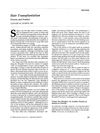 2 citations,
August 1994 in “The Journal of Dermatologic Surgery and Oncology”
2 citations,
August 1994 in “The Journal of Dermatologic Surgery and Oncology” The article concludes that hair transplantation is advancing, but a reliable way to ensure complete tumor removal is still needed.
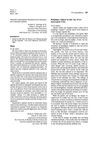 2 citations,
March 1985 in “Journal of The American Academy of Dermatology”
2 citations,
March 1985 in “Journal of The American Academy of Dermatology” Minoxidil solution used on the scalp did not lower blood pressure in patients without hypertension.
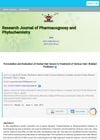 1 citations,
May 2023 in “Research journal of pharmacognosy and phytochemistry”
1 citations,
May 2023 in “Research journal of pharmacognosy and phytochemistry” Herbal hair serum with natural ingredients can effectively treat common hair problems.
 1 citations,
August 2022 in “Molecules”
1 citations,
August 2022 in “Molecules” Prunus mira kernels contain components that can promote hair growth in mice.
 1 citations,
April 2018 in “Our Dermatology Online”
1 citations,
April 2018 in “Our Dermatology Online” Massaging the scalp with a cosmetic containing certain natural inhibitors can significantly regrow hair in men with pattern baldness.
 1 citations,
April 2017 in “Journal of Investigative Dermatology”
1 citations,
April 2017 in “Journal of Investigative Dermatology” A new one-step test can quickly identify skin cancer during surgery.
 1 citations,
March 2017 in “Al-maǧallaẗ al-’irāqiyyaẗ li-l-’ulūm al-ṣaydalāniyyaẗ/Iraqi journal of pharmaceutical sciences”
1 citations,
March 2017 in “Al-maǧallaẗ al-’irāqiyyaẗ li-l-’ulūm al-ṣaydalāniyyaẗ/Iraqi journal of pharmaceutical sciences” Nutrient antioxidants helped reduce prednisolone dosage and improved hair growth in alopecia areata patients.




























